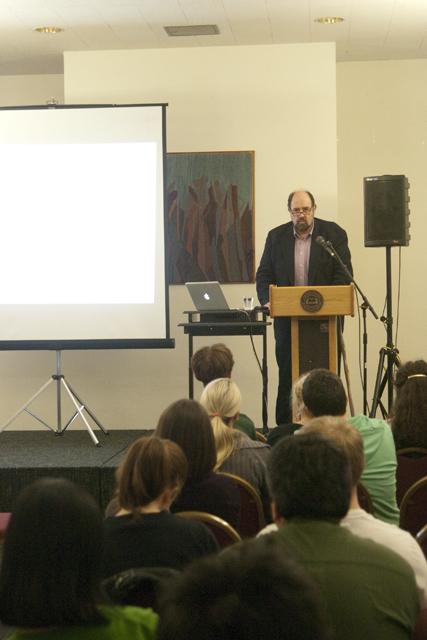
Professor William Beeman, anthropology department chair and professor at the University of Minnesota, gave an anthropologist’s perspective on the United States’ foreign policy in the Middle East during his lecture on May 9.
The lecture, titled “Middle East Foreign Policy: Why the State Department Needs Anthropologists,” focused on how the United States would handle foreign policy if it considered some of the cultural and political differences between the Middle East and the United States.
“We didn’t even understand our own culture very well,” Beeman said, referencing the United States’ lack of cultural expertise in foreign and American policy.
Beeman used the analogy of a baseball team to explain America’s reasons for foreign policy, saying that after World War II, America was like the best baseball team in the world. The only way to make the game more interesting was to split up the teams, which is an analogy for America becoming more invested in foreign policy.
Beeman explained five commonly held misconceptions that the American public generally believes to be true: the world consists of nation-states, the world is dichotomous, the world is ruled by elite rulers, the world is ruled by violence and wealth and all events have approximate causes.
“The U.S. has a bad habit of believing that the only reason things happen is because of immediate causes,” Beeman said, explaining that the current uprising in the Middle East is the result of things that have happened for centuries.
Some of these things included strong colonial influence and a feeling of being robbed by stronger powers, which has led to the current conflict, he said.
Beeman explained that the Middle East populace has different interests than the American populace and is more focused on spiritual matters.
“He talked about how they aren’t influenced by guns and money at all,” sophomore Julia Cooper, said. “The people would rather have something to believe in, something more than that.”
Cooper said she attended the lecture to hear what Beeman considered to be an anthropologist’s place in resolving conflict.
“I was really interested in hearing about how anthropologists could help with the situation over there,” Cooper said. “The main idea behind that was instead of looking at how we can help solve their problems from a governmental or military viewpoint, we should go there and experience the culture and actually see what’s going on in the Middle East on a daily basis.”
_________________________________________________________________________________
Brittany Baker/Staff reporter
Brittany Baker can be reached at [email protected]






